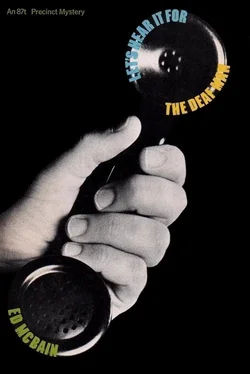They were young people in a neighborhood as severely divided as any war-torn Asian countryside. In the days when the city was young, or at least younger, the neighborhood population had been mostly immigrant Jewish, with a dash of Italian or Irish thrown in to keep the pot boiling. It boiled a lot in those days (ask Meyer Meyer, who lived in a similar ghetto as a boy, and who was chased through the streets by bigots shouting, “Meyer Meyer, Jew on fire!”), and eventually simmered down to a sort of armed truce between the old-timers, whose children went to college or learned New World trades and moved out to Riverhead or Calm’s Point. The next wave of immigrants to hit the area were United States citizens who did not speak the language and who enjoyed all the rights and privileges of any minority group in the city; that is to say, they were underpaid, overcharged, beaten, scorned, and generally made to feel that Puerto Rico was not a beautiful sun-washed island in the Caribbean but rather a stink hole on the outskirts of a smelly swamp. They learned very rapidly that it was all right to throw garbage from the windows into the backyard, because if you didn’t the rats would come into the apartment to eat it. Besides, if people are treated like garbage themselves, they cannot be castigated for any way they choose to handle their own garbage. The Puerto Ricans came, and some of them stayed only long enough to earn plane fare back to the island. Some followed the immigration pattern established by the Europeans: they learned the language, they went to school, they got better jobs, they moved into the outlying districts of the city (where they replaced those now-affluent Americans of European stock who had moved out of the city entirely, to private homes in the suburbs). Some remained behind in the old neighborhood, succumbing to the deadly grinding jaws of poverty, and wondering occasionally what it had been like to swim in clear warm waters where the only possible threat was a barracuda.
The long-haired youths must have seemed like invading immigrants to the Puerto Ricans who still inhabited the area. It is easy to turn prejudice inside out; within every fat oppressor, there lurks a skinny victim waiting to be released. The hippies, the flower children, the “freaks” if you prefer, came seeking peace and talking love, and were greeted with the same fear, suspicion, hostility, and prejudice that had greeted the Puerto Ricans upon their arrival. In this case, however, it was the Puerto Ricans themselves who were doing the hating — you cannot teach people a way of life, and then expect them to put it conveniently aside. You cannot force them into a sewer and then expect them to understand why the sons and daughters of successful Americans are voluntarily seeking residence in that very same sewer. If violence of any kind is absurd, then victims attacking other victims is surely ludicrous. Such was the situation in the South Quarter, where the young people who had come there to do their thing had taken instead to buying pistols for protection against other people who had been trying to do their thing for more years than they could count. In recent months, bikies had begun drifting into the area, sporting their leather jackets and their swastikas and lavishing on their motorcycles the kind of love usually reserved for women. The bikies were bad news. Their presence added a tense note of uneasiness and unpredictability to an already volatile situation.
The Puerto Ricans Carella spoke to that afternoon did not enjoy talking to a cop. Cops meant false arrests, cops meant bribes, cops meant harassment. It occurred to him that Alex Delgado, the one Puerto Rican detective on the squad (in itself a comment) might have handled the investigation better, but he was stuck with it, and so he plunged ahead, showing the picture, asking the questions, getting the same response each time: No, I do not know him. They all look alike to me.
The bikie’s name was Yank, meticulously lettered in white paint on the front of his leather jacket, over the heart. He had long frizzy black hair and a dense black beard. His eyes were blue, the right one partially closed by a scar that ran from his forehead to his cheek, crossing a portion of the lid in passing. He wore the usual gear in addition to the black leather jacket: the crushed peaked cap (his crash helmet was on the seat of his bike, parked at the curb), a black tee shirt (streaked white here and there from bleach-washing), black denim trousers, brass-studded big-buckled belt, black boots. An assortment of chains hung around his neck and the German iron cross dangled from one of them. He was sitting on a tilted wooden chair outside a shop selling posters (LBJ on a motorcycle in the window behind him), smoking a cigar and admiring the sleek chrome sculpture of his own bike at the curb. He did not even look at Carella as he approached. He knew instantly that Carella was a cop, but bikies don’t know from cops. Bikies, in fact, sometimes think they themselves are the cops, and the bad guys are everybody else in the world.
Carella didn’t waste time. He showed his shield and his I.D. card, and said, “Detective Carella, 87th Squad.”
Yank regarded him with cool disdain, and then puffed on his cigar. “Yeah?” he said.
“We’re trying to get a positive identification on a young man who may have been living in the neighborhood...”
“Yeah?”
“I thought you might be able to help.”
“Why?”
“Do you live around here?”
“Yeah.”
“How long have you been living here?”
“Three of us blew in from the Coast a few weeks back.”
“Transients, huh?”
“Mobile, you might say.”
“Where are you living?”
“Here and there.”
“Where’s that?”
“We drop in various places. Our club members are usually welcome everywhere.”
“Where are you dropping in right now?”
“Around the corner.”
“Around the corner where?”
“On Rutland. Listen, I thought you were trying to identify somebody. What’re all these questions about? You charging me with some terrible crime?”
“Have you got a terrible crime in mind?”
“The bike’s legally parked, I was sitting here smoking a cigar and meditating. Is that against the law?”
“Nobody said it was.”
“So why all the questions?”
Carella reached into his jacket pocket, took out his notebook, and removed from it the photograph of the dead man. “Recognize him?” he asked, and handed the picture to Yank, who blew out a cloud of smoke, righted his chair, and then held the picture between his knees, hunched over it, as he studied it.
“Never saw him in my life,” he said. He handed the picture back to Carella, tilted the chair against the wall again, and drew in another lungful of cigar smoke.
“I wonder if I could have your full name,” Carella said.
“What for?”
“In case I need to get in touch with you again.”
“Why would you need to get in touch with me? I just told you I never saw this guy in my life.”
“Yes, but people sometimes come up with information later on. Since you and your friends are so mobile , you might just hear something that...”
“Tell you what,” Yank said, and grinned. “You give me your name. If I hear anything, I’ll call you .” He blew two precise smoke rings into the air, and said, “How’s that?”
“I’ve already given you my name,” Carella said.
“Shows what kind of memory I’ve got,” Yank said, and again grinned.
“I’ll see you around,” Carella said.
“Don’t count on it,” Yank answered.
At ten minutes to one on Wednesday afternoon, Augusta Blair called the squadroom and asked to talk to Detective Kling, who was on his lunch hour and down the hall in the locker room, taking a nap. Meyer asked if Kling could call her back and she breathlessly told him she had only a minute and would appreciate it if he could be called to the phone. It had to do with the burglary, she said. Meyer went down the hall and reluctantly awakened Kling, who did not seem to mind at all. In fact, he hurried to his desk, picked up the receiver, and said, quite cheerfully, “Hello, Miss Blair, how are you?”
Читать дальше












